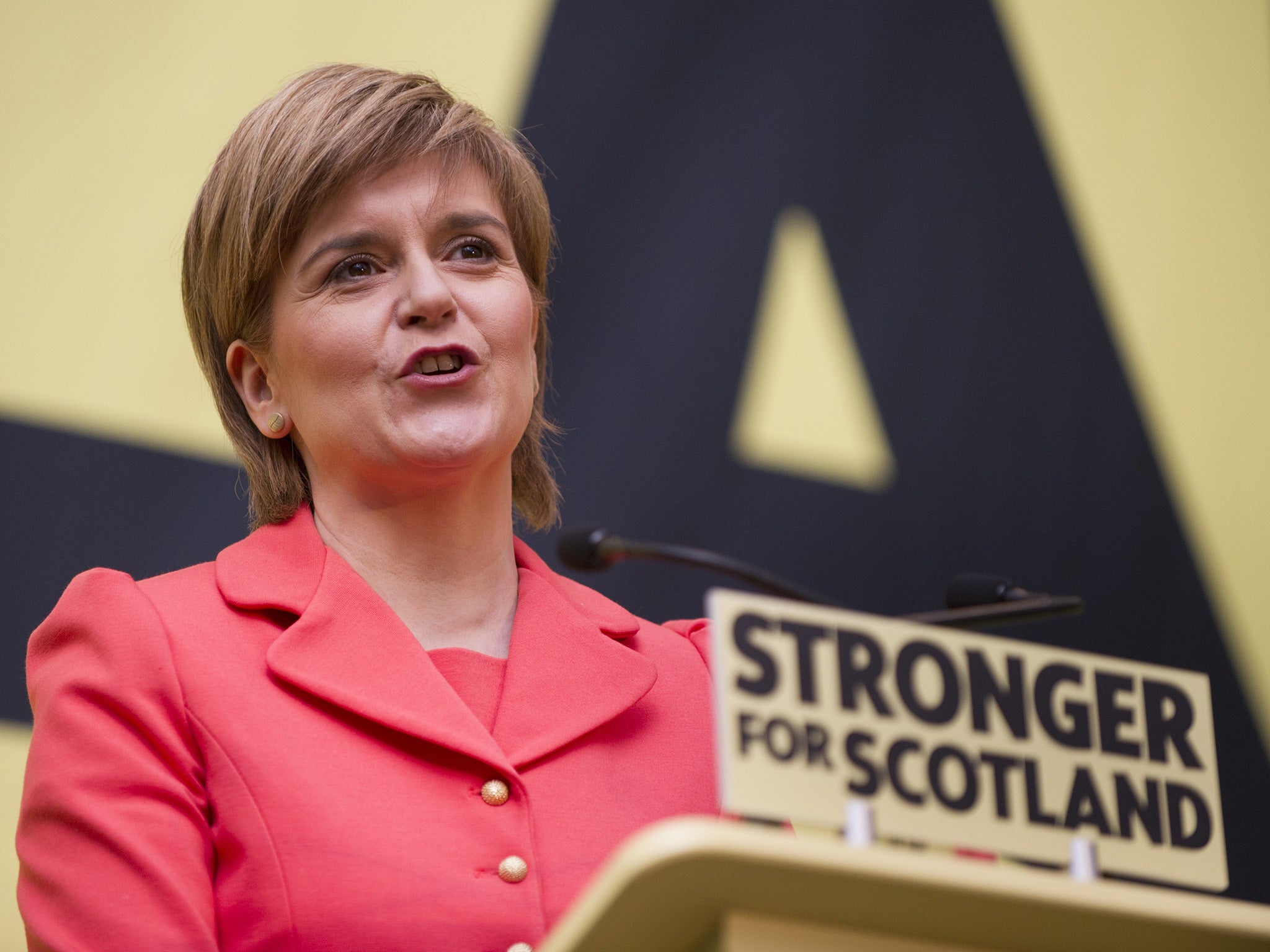General Election 2015: SNP would need to make 'substantial' cuts if given fiscal control of Scotland, think-tank claims
Financial independence is one of the party's manifesto targets

The SNP will have to make “substantial” spending cuts or raise taxes if it is handed full control of Scotland’s finances after the general election, according to a new analysis by the Institute for Fiscal Studies (IFS).
Rather than shrinking as the SNP hopes, the gap in a financially independent Scotland's finances is actually likely to grow from £7.6bn this year to £9.7bn in 2019/20 based on current projections, the research by the respected economics think-tank concluded.
The analysis was published a day after the SNP launched its general election manifesto with a commitment to push for full fiscal responsibility for Scotland, a process the party conceded would take “a number of years”.
But the IFS said that even to plug the hole in its finances by 2019/20, Scottish revenues per person would need to grow by more than twice as much as forecast for the UK as a whole. Even a longer time span of 10 or 15 years would require a “step-change” in Scottish economic performance, it said.
Are you undecided about who to vote for on 7 May? Are you confused about what the parties stand for and what they are offering? Take this interactive quiz to help you decide who to vote for...
“Delaying a move to full responsibility for a few years would not on its own deal with the fiscal gap,” said senior IFS economist David Phillips. “Indeed, if anything, given current spending and revenue forecasts, the gap would likely grow rather than shrink over the next few years.
“It would remain the case that full fiscal responsibility would likely entail substantial spending cuts or tax rises in Scotland. While a big and sustained rebound in oil revenues or significantly higher growth in Scotland could mitigate this, there can be no presumption that either would.”
The SNP’s critics seized on the research. Scottish Labour accused the party of signing Scotland up to a programme of “massive spending cuts that would make even the Tories blush”, while the Scottish Conservatives said full fiscal autonomy would create “a black hole in our public finances which would keep getting deeper”.
In response, the SNP said the IFS had not taken into account its plans to end austerity, another key manifesto promise. The party also pointed out that Scotland’s deficit as a share of GDP would have almost halved by 2020, from 8.6 per cent to 4.6 per cent. However, the IFS predicted the UK would be running a budget surplus by this time.
The row over Scotland’s financial future came as Sir John Major, the former Tory prime minister, predicted that a Labour government propped up by the SNP would be a “recipe for mayhem”. The nationalist party would demand policies favouring Scotland and would create “merry hell” if they were denied, he added, warning that “the nightmare of a broken United Kingdom has not gone away”.
However, his comments were dismissed by SNP leader Nicola Sturgeon, who described them as an “an affront to democracy”. She added: “My message to John Major is Scotland’s voice deserves to be heard in whatever way the Scottish people choose.”
During an address to the Scottish TUC, she said that far from undermining a Labour government, the SNP would “vigorously and loudly” support some of its policies, such as an increase in the minimum wage and a crackdown on zero-hours contracts.
Divisions also appeared among senior Tories over David Cameron’s tactic of focussing on the dangers posed by an influential SNP presence at Westminster. Lord Forsyth, the Conservative peer, described the strategy as a “short term and dangerous game” which threatens the Union.
Scottish Conservatives leader Ruth Davidson said she agreed with the former Scotland Secretary on the issue. “The Tory party shouldn’t be welcoming the idea that there is going to be a lot of SNP MPs at Labour’s expense,” she said.
Lord Tebbit also described Mr Cameron’s warnings about the SNP as a “puzzling” and “pointless” tactic. “The logic would seem to be that [in Scotland] Conservatives should vote tactically for Labour as the lesser of two evils,” he said.
The Prime Minister attempted to brush off the criticism yesterday. “All I am doing is pointing out what is as plain as the nose on your face – which is, right now, Labour is facing a wipe-out in Scotland,” he said during an event in Leeds.
The Independent has got together with May2015.com to produce a poll of polls that produces the most up-to-date data in as close to real time as is possible.
Click the buttons below to explore how the main parties' fortunes have changed:
All data, polls and graphics are courtesy of May2015.com. Click through for daily analysis, in-depth features and all the data you need. (All historical data used is provided by UK Polling Report)
Join our commenting forum
Join thought-provoking conversations, follow other Independent readers and see their replies
Comments
Bookmark popover
Removed from bookmarks